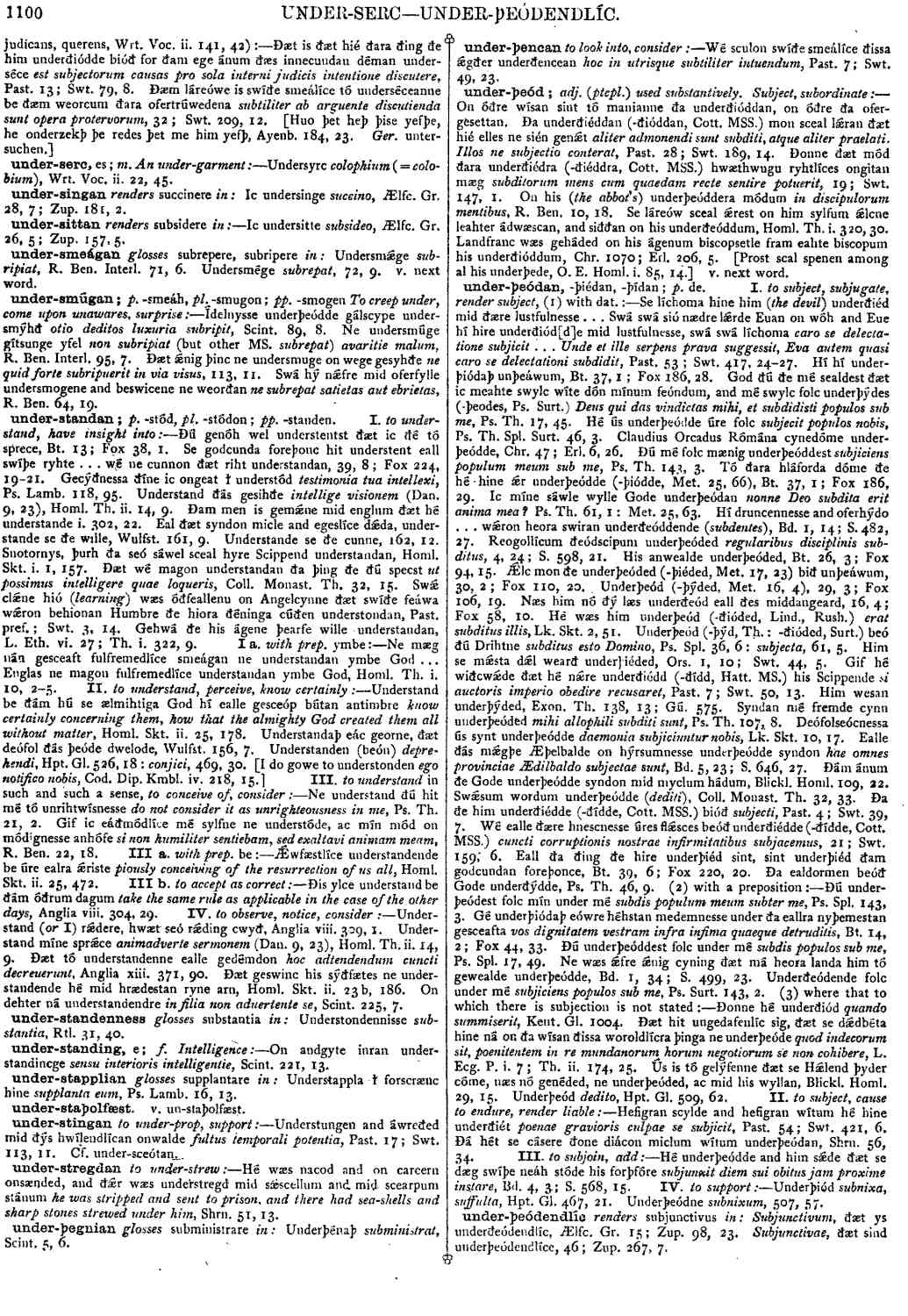under-standan
- verb [ strong ]
-
Ðú genóh wel understentst ðæt ic ðé tó sprece,
- Bt. 13 ;
- Fox 38, 1.
-
Se godcunda foreþonc hit understent eall swiþe ryhte ... wé ne cunnon ðæt riht understandan,
- 39, 8 ;
- Fox 224, 19-21.
-
Gecýðnessa ðíne ic ongeat ł understód
testimonia tua intellexi,
- Ps. Lamb. 118, 95.
-
Understand ðás gesihðe
intellige visionem (Dan. 9, 23),
- Homl. Th. ii. 14, 9.
-
Ðam men is gemǽne mid englum ðæt hé understande
- i. 302, 22.
-
Eal ðæt syndon micle and egeslíce dǽda, understande se ðe wille,
- Wulfst. 161, 9.
-
Understande se ðe cunne,
- 162, 12.
-
Snotornys, þurh ða seó sáwel sceal hyre Scippend understandan,
- Homl. Skt. i. 1, 557.
-
Ðæt wé magon understandan ða þing ðe ðú specst
ut possimus intelligere quae loqueris,
- Coll. Monast. Th. 32, 15.
-
Swǽ clǽne hió ( learning ) wæs óðfeallenu on Angelcynne ðæt swíðe feáwa wǽron behionan Humbre ðe hiora ðéninga cúðen understondan,
- Past. pref. ;
- Swt. 3, 14.
-
Gehwá ðe his ágene þearfe wille understandan,
- L. Eth. vi. 27 ;
- Th. i. 322, 9.
-
-- Ne mæg nán gesceaft fulfremedlíce smeágan ne understandan ymbe God ... Englas ne magon fulfremedlíce understandan ymbe
- God, Homl. Th. i. 10, 2-5.
-
Understand be ðám hú se ælmihtiga God hí ealle gesceóp bútan antimbre
know certainly concerning them, how that the almighty God created them all without matter,
- Homl. Skt. ii. 25, 178.
-
Understandaþ eác georne, ðæt deófol ðás þeóde dwelode,
- Wulfst. 156, 7.
-
Understanden (beón)
deprehendi,
- Hpt. Gl. 526, 18:
conjici,
- 469, 30.
[I do gowe to understonden ego notifico nobis,
- Cod. Dip. Kmbl. iv. 218, 15.
-
Ne understand ðú hit mé tó unrihtwísnesse
do not consider it as unrighteousness in me,
- Ps. Th. 21, 2.
-
Gif ic eáðmódlíce me sylfne ne understóde, ac mín mód on módignesse anhófe
si non humiliter sentiebam, sed exaltavi animam meam,
- R. Ben. 22, 18.
-
-- Ǽwfæstlíce understandende be úre ealra ǽriste
piously conceiving of the resurrection of us all,
- Homl. Skt. ii. 25, 472.
-
-- Ðis ylce understand be ðám óðrum dagum
take the same rule as applicable in the case of the other days,
- Anglia viii. 304, 29.
-
Understand (or I) rǽdere, hwæt seó rǽding cwyð,
- Anglia viii. 309, 1.
-
Understand míne sprǽce
animadverte sermonem (Dan. 9, 23),
- Homl. Th. ii. 14, 9.
-
Ðæt tó understandenne ealle gedémdon
hoc adtendendum cuncti decreuerunt,
- Anglia xiii. 371, 90.
-
Ðæt geswinc his sýðfætes ne understandende hé mid hrædestan ryne arn,
- Homl. Skt. ii. 23 b, 186.
-
On dehter ná understandendre
in filia non aduertente se,
- Scint. 225, 7.
Bosworth, Joseph. “under-standan.” In An Anglo-Saxon Dictionary Online, edited by Thomas Northcote Toller, Christ Sean, and Ondřej Tichy. Prague: Faculty of Arts, Charles University, 2014. https://bosworthtoller.com/32847.
Checked: 1